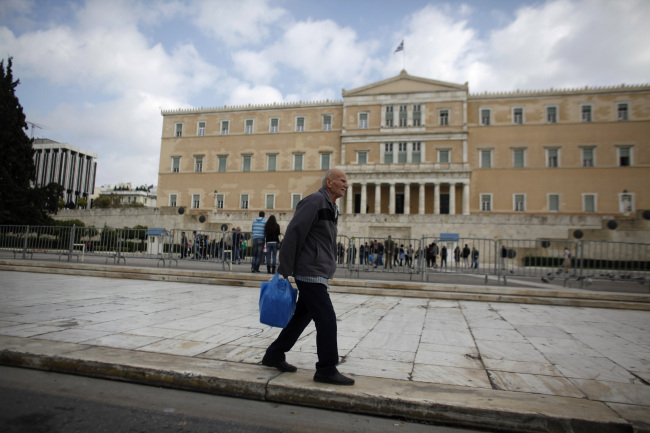ATHENS (AP) ― Greece revealed Monday plans to spend up to 10 billion euro ($13 billion) in a bond buyback program that it hopes will help stabilize its mountainous debt.
The buyback is part of efforts to reform Greece’s moribund economy and reduce its debt to sustainable levels, and is among steps the country is taking to secure the disbursement of vital international rescue loans.
If implemented on time, the new measures “are positive developments, which create plausible expectations of a recovery of the Greek economy,” the Bank of Greece said in an interim report on monetary policy released Monday.
“This outcome, however, hinges upon a consistent implementation of all the measures legislated, together with policies that will speed up the onset of recovery, including a broader program of structural reforms,” it warned. “Any delays will push the recovery back, with consequences that will be far more severe than anything that has so far happened.”
 |
A pedestrian carries his shopping bag past the Greek parliament on Syntagma square in Athens. (Bloomberg) |
The bond buyback was agreed in a meeting of eurozone finance ministers in Brussels last week, which also approved the release of a critical 44 billion euro ($57 billion) installment of rescue loans from the International Monetary Fund and the other 16 European Union countries that use the euro.
It is hoped the buyback will shave about 20 billion euro ($26 billion) off the country’s debt. It comes less than a year after private holders of Greek debt agreed a big writedown in the value of their Greek bonds.
Under the buyback program, private holders of Greek bonds, such as banks, pension funds and other investors, have until Friday to register their interest in participating. The sale will be conducted by what is known as a Dutch auction, in which prices start high and then decline.
There are 20 series of outstanding bonds eligible for the scheme, which will command different prices depending on the bond maturity, the Public Debt Management Agency said. Greece has set a minimum range of 30.2 percent to 38.1 percent of the bond’s face value, and a maximum of between 32.2 percent and 40.1 percent, depending on the bond issue. The buyback should be completed by Dec. 17.
The scheme is expected to be of particular interest to investors who bought the bonds on the secondary market at far cheaper prices than their original value ― over the past few months, some Greek bonds have hit as little as 11 percent of their face value.
Greek officials are to brief eurozone finance ministers on details of the scheme when they meet in Brussels later Monday.
Greece has been dependent since May 2010 on international rescue loans from the IMF and its partners in the euro. The funds have prevented the country going bankrupt and possibly leaving the euro.
In return, Greece has had to take drastic measures to reform its economy, including slashing pensions and salaries, and increasing taxes. But the measures have not had the effect Greece’s creditors had hoped, with a worse-than-expected recession now heading into its sixth year and undermining efforts to make the country’s debt sustainable.
The Bank of Greece projected that the country’s economy would contract by more than 6 percent of gross domestic product this year, and by a further 4-4.5 percent next year. Unemployment, currently at an annual average of just over 23.5 percent, is expected to exceed 26 percent in 2013 and 2014.
“A recession of this intensity and duration is unprecedented in Greece’s peacetime history and has taken a heavy toll not only on incomes, but also on potential output and social cohesion,” the central bank’s report said.








